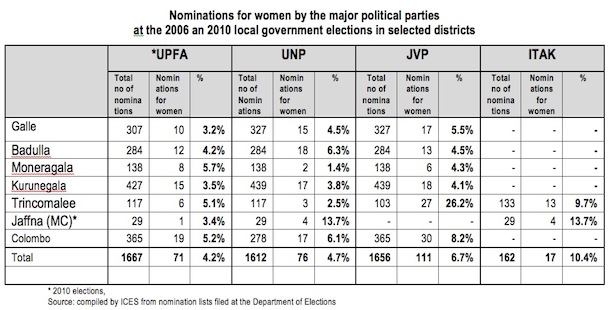Women constitute 52% of Sri Lanka’s population, however women constitute only 2% of elected members of Local Authorities. A critical concern is the very low levels of nominations received by women (approximately 6%) from political parties (See table below). Much of the blame for this under representation must be borne by the major political parties which have consistently failed to give adequate nominations to women. They are the parties that win seats in any local election.
In South Asia, our immediate neighbours with whom we enjoy close historical and cultural ties, the under- representation of women at local elected political bodies have been addressed through legally enforceable quotas for women. In fact Sri Lanka remains the only country without any special measures to facilitate women’s representation in Local Authorities. In Bangladesh, at least 25% of seats are reserved for women in Union Councils (1996 legislation); in India not less than 33% of seats are reserved for women and other marginalized groups in all Panchayats or Local Bodies (1992 Constitutional amendment); in Nepal 20% of Village and Municipal Councils are reserved for women (1990 Constitution); and in Pakistan 33% of seats are reserved for women at the Union, Tehsil (Municipality) and District level (2000 Devolution Plan). Obviously, all these countries have recognized the necessity for women’s representation in local authorities as both a factor of development as well as a fundamental rights issue. We remind the two major political parties that such provision is necessary to fulfill promises made in Mahinda Chintanaya and Deya Dinawan Aya to the effect that nominations for women will be increased.
Serious under representation of women among elected members of local government bodies has distorted the agendas of these agencies in ways that divert attention away from vital issues such as malnutrition, water and sanitation, alcoholism and gender based violence.
The government has just dissolved Local Authorities around the country and called for elections to be held in March 2011. We urge all political parties to ensure that women get at least 25% of the nominations at these elections. Unless and until nominations by political parties are substantially increased, it will not be possible to increase women’s representation in Local Authorities, which in turn will continue to limit women’s participation in Provincial Councils and in national level politics.
There are challenges, and serious ones at that. As Chulani Kodikara avers in Women and politics in Sri Lanka: The challenges to meaningful participation,
“…women’s groups will continue to demand for increased representation for women in political institutions on the basis of equality, democracy, justice, etc even though this language appears to have lost all currency in Sri Lanka. No amount of appeal to these values has so far changed party attitudes towards nominations for women even at the local level. There is clearly too much at stake. As many political analysts point out political power in Sri Lanka is maintained through elaborate and well organized patron – client relationships that connect actors from the national to the local levels. These relationships play a central role in the socio-economic as well as political benefits, opportunities and positions available to people.  Nominations during election times are opportunities to bestow rewards on those party loyalists, but not indiscriminately. To be considered a ‘winnable’ candidate, money and muscle are important as is the active involvement in maintaining and supporting the chains of dependency between the party and the constituency. Most women lack both money and muscle and are passive ‘clients’ in the margins of these networks (except if you a wife, widow or daughter of a politician of course).”
Further, as noted in a previous article published on Groundviews,
“Ensuring gender justice in the aftermath of war does not happen in isolation. It is more often than not part of a wider process which addresses root causes of the conflict and which attempts to negotiate a new post war social order in which all people irrespective ethnic, gender, religious or other differences are ensured equality and social justice. Post war reconstruction and reconciliation in Sri Lanka is however almost exclusively government led without the benefit of such a process. This is what we desperately need an inclusive process in which all of us, men and women, can re-imagine and renegotiate the fundamental contours of this nation state in a way that the rights of all identity groups are recognized and respected.”
[Editors note: Also see in-depth video interview with Chulani Kodikara here. The interview deals with, inter alia, the challenge of women’s representation in party politics in Sri Lanka.]

